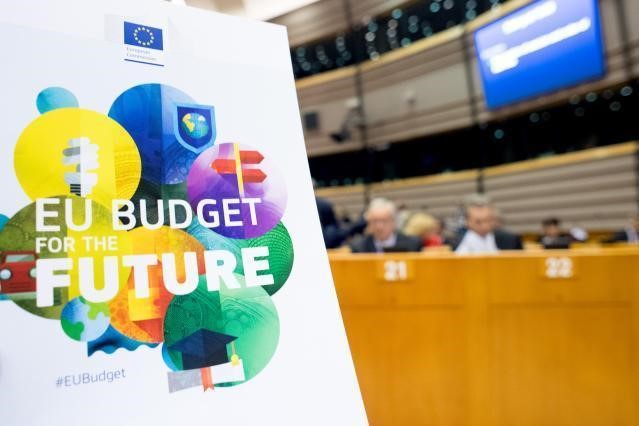Why is it Crucial to Support Gender Budgeting?
The Council of Europe defines gender budgeting as an application of gender mainstreaming in the budgetary process. In this regard, gender mainstreaming refers to the integration of a gender perspective into all policies stages, regulatory measures and spending programmes, with a view to promoting equality between women and men and combating discrimination. Gender budgeting is thus a gender-based assessment of budgets, incorporating a gender perspective at all levels of the budgetary process and restructuring revenues and expenditures in order to promote gender equality.
Current economic indicators and macroeconomic policies do not consider the impact of women’s unpaid care work. Meanwhile, the value of unpaid domestic work and unpaid family care work ranged between 27% and 37% of EU GDP in 2010. Unlike climate change and biodiversity – both recognised as cross-cutting issues to be treated with an overall target of 25% of EU expenditure contributing to climate objectives – gender mainstreaming has no standalone quantitative target even though it is also described as a horizontal principle. Moreover, according to the European Parliament’s Resolution of 14 March 2017: “tools for gender mainstreaming, such as gender indicators, gender impact assessment and gender budgeting, are rarely used in policy design and implementation.”
The Time is Now
The current on-going Multiannual Financial Framework (MFF) negotiations and upcoming European elections at the end of May will determine gender budgeting for the upcoming Parliamentary term. Prior to be adopted by the Council, the MFF must be accepted by the Parliament. The MFF sets out the annual amount that can be spent on policy areas. The entry into force of the Treaty of Lisbon in 2009, transformed the status of the MFF. It is at present a legally binding act and a key step to mark financial guidelines – including gender equality measures.
The real cost for the EU will occur if no actions are taken to narrow the gender gap.
Based on the assumption that any concrete action is taken without a dedicated funding to it, gender equality financing needs to have more place within the EU budget to make gender equality a reality. As citizens, we must request the EU to uphold and respect its own founding institutional principles and legal texts. In this sense, supporting gender-responsible budgeting means standing for a feminist EU and acknowledging that we are founded on a set of values including gender equality which is enriched both as goal and a principle of the EU.
Fake News
Recently, there has been an increasing number of allegations (disproportionality by the far right parties such as VOX in Spain) stating that an excessive amount of funds are being allocated to civil society organisations and local institutions dedicated to preventing gender-based violence. These statements; however, hold no ground as proved by the 2014-2020 ESIF; which highlighted that only 1% of ESIF (European Structural & Investment Funds) budget is allocated to gender equality measures. The cost of a feminist EU will not be found scratching fake arguments when just 1% of the ESIF budget has been allocated to gender equality measures.
Gender equal societies are not symptomatic of economic loss but instead they are the foundations for economic growth.
This rejection of gender-promotion allocation is simply rooted in a lack of understanding as to their purpose. Tools promoting gender equality are investments towards strong and fair societies. Currently, one could argue the opposite – more and responsible funding is necessary – as inequalities between men and women remain pervasive. The real cost for the EU will occur if no actions are taken to narrow the gender gap. A gender responsible European budget would accelerate the creation of an estimated 10 million jobs and €3.15 trillion increase in the EU GDP by 2050. Indeed gender mainstreaming is currently treated as an issue with little impact on the actual content of funding programmes when policies promoting gender equality effect even stronger impact on GDP than some education policies.
A Matter of Justice and Human Rights
Gender equal societies are not symptomatic of economic loss but instead they are the foundations for economic growth. Gender budgeting at EU level should be based on fairness and women’s rights. Women account for more than half of the population and in no way gender equality will improve if only 1% of the EU budget is allocated to such purpose.
The above exposed EU funds’ weaknesses demonstrate the ample room for improvement. However, we acknowledge EU’s efforts to improve the state of gender equality. On 1976, the Court of Justice of the EU via the Defrenne judgment set up the beginning of the debates on equal pay for men and women. 40 years later, in 2014, the Council of Europe achieved to make the Istanbul Convention come into force, the first legally international binding instrument on preventing and combating violence against women and girls. It is precisely because the EU has been a strong partner in the fight for gender equality that its capacity and potential should be used to do much more and put the attention on the issue of gender budgeting.
A Feminist European Parliament for a Gender Responsive Europe
On the 8 March we spoke out for gender equality and now on the 23-26 May, we can vote for a feminist European Parliament, which will push for the gender responsive EU we deserve. The next EU elections will be in five years; therefore, we should take this opportunity to make our voices heard and demand a gender responsive Europe which sees gender budgeting as a real issue to work on.






Average Rating